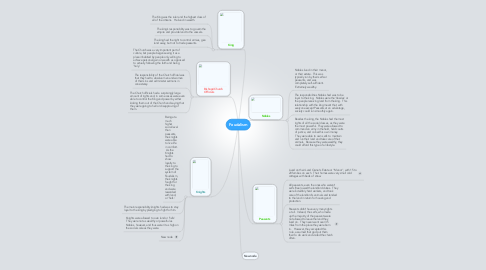Feudalism
by Carson F

1. Knights
1.1. Being at a much higher social level than peasants, the knights were able to live life in comfort. As the Knights had to show loyalty to the king to support the system of Feudalism, the knights fought for the king and were rewarded with land, or 'fiefs'.
1.2. The main responsibility knights had was to stay loyal to the king by pledging to fight for him.
1.3. Knights were allowed to own land or 'fiefs' They were not as wealthy or powerful as Nobles, however, and thus weren't as high on the social scale as they were.
1.4. New node
2. Bishops/Church Officials
2.1. The Church was a very important part of culture, but people began seeing it as a place inhabited by people only willing to achieve personal gain or wealth as opposed to actually following the faith and being 'holy'.
2.2. The responsibility of the Church official was that they had to absolve men and women of their sins and administer sermons in consistency.
2.3. The Church officials had a surprisingly large amount of rights and, in some cases were even able to control the King and power by either kicking them out of the Church and saying that they were going to hell or disapproving of them.
3. King
3.1. The King was the ruler and the highest class of all of the citizens. He lived in wealth.
3.2. The king's responsibility was to govern the empire and provide land to the vassels.
3.3. The king had the right to control armies, give land away, but not to trade peasants.
4. Nobles
4.1. Nobles lived in their manor, or their estate. This was typically run by their serfs or peasants, and was completely self-sufficient. Extremely wealthy.
4.2. The responsibilities Nobles had was to be loyal to the king. Nobles were the 'Vessles' or the people receiving land from the king. This relationship with the king meant that, with everyone except Peasants at an advantage, society could run smoothly again.
4.3. Besides the king, the Nobles had the most rights of all the social classes, as they were the most powerful. They were allowed to command an army in the field, held courts of justice, and coined his own money. They were able to own serfs to maintain and run their land and take care of their animals. Because they were wealthy, they could afford this type of a lifestyle.
5. Peasants
5.1. Lived on their Land Owner's Estate or "Manor", with 15 to 20 families on each. Their homes were very small cold cottages with beds of straw.
5.2. All peasants, even the ones who weren't serfs (free) owed the landlord duties. They were incredibly hard workers, and took care of the landlord's animals and tended to the land in return for housing and protection.
5.3. Peasants didn't have very many rights at all. Indeed, the serfs, who made up the majority of the peasants were not allowed to leave the land they lived on. They never went over 35 miles from the place they were born in. However, they accepted this role, assumed that god put them their to do work and visited the church often.
6. New node


